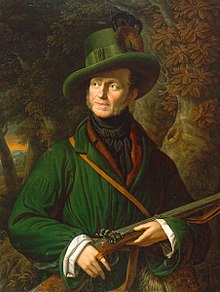Gustav Wilhelm of Mecklenburg

Gustav Wilhelm, Duke of Mecklenburg [-Schwerin], origin. Gustav, Duke of Mecklenburg (born January 31, 1781 in Ludwigslust ; † January 10, 1851 there ) was a member of the (grand) ducal house of Mecklenburg-Schwerin .
Life
Gustav was the third child and second son of Duke Friedrich Franz I (1756–1837) and his wife Luise von Sachsen-Gotha (1756–1808). In January 1807, he went with the ducal family into exile by Altona .
He served as a captain in the Swedish army and as a major in the Prussian cavalry. In the spring of 1813 he was on a grand tour in Naples , but returned to Ludwigslust because of the beginning of the war of liberation and became a major in the Mecklenburg-Schwerin regiment, volunteer hunter on horseback. On December 10, 1813, he was wounded in the battle of Sehestedt , lost two fingers and was briefly taken prisoner in Denmark, but was exchanged after a few hours. After several years in Italy , he returned to Mecklenburg in 1827.
From 1830 to 1832 he had the villa Gustava built as his residence in Ludwigslust by the master builder Friedrich Georg Erich Groß .
Duke Gustav was a talented musician and performed as a singer and guitarist at court concerts in Ludwigslust Palace. Louis Massonneau dedicated his Six Trios to him .
He was a canon in Magdeburg and remained unmarried. Karl Heinrich Ulrichs mentions him as homosexual in his Argonauticus .
Gustav died on January 10, 1851 after a long period of suffering in Ludwigslust. The ruling Grand Duke Friedrich Franz II , his grand-nephew, ordered state mourning; Gustav was buried on January 15, 1851 in the Louisen Mausoleum in the Ludwigslust Palace Park.
Grand Duke Friedrich Franz II. Raised the Villa Gustava that he inherited, in June 1851 and a corresponding House and Garden Inventarium an indivisible, inalienable and unverschuldbaren Familienfideikommisse , and gave Duke William of Mecklenburg , the usufruct privileges. During the First World War and until 1923, Duchess Marie von Mecklenburg-Schwerin used the villa. It has been preserved to this day, albeit in ruins, and is a listed building .
Awards
- Mecklenburg Military Merit Medal
- Mecklenburg campaign medal
- Grand Cross of the Red Eagle Order
- Royal Prussian Order of St. John
- Grand Cross of the Order of the Sword
- Grand Cross of the Order of the Dutch Lion
- Grand Cross of the Guelph Order
- Russian Order of Saint George
- Elephant Order (448th award) on July 14, 1841
literature
- Heinrich Francke: Mecklenburg's hardship and struggle before and in the war of liberation: to celebrate the 50th anniversary of the reign of Sr. Royal Highness of the Most Serene Grand Duke Friedrich Franz the First of Mecklenburg-Schwerin, illustrated from manuscripts and printed documents. Wismar: Schmidt & v. Cossel 1835
- Johann Heinrich Friedrich Berlien: The elephant order and its knights. Copenhagen: self-published 1846, p. 178
- Grete Grewolls: Who was who in Mecklenburg and Western Pomerania. The dictionary of persons . Hinstorff Verlag, Rostock 2011, ISBN 978-3-356-01301-6 , p. 3654 .
Web links
Individual evidence
- ↑ Francke (lit.), p. 243
- ↑ Francke (lit.), p. 370
- ↑ Otto Kade : The music collection of the Grand Ducal Mecklenburg-Schwerin Princely House in the last two centuries. Volume 2, Schwerin 1893, p. 49f.
- ^ Karl Heinrich Ulrichs: Argonauticus. Serbe, Leipzig 1869, p. 100.
- ^ Government Gazette for Mecklenburg-Schwerin. 1851, p. 13.
- ^ Government Gazette for Mecklenburg-Schwerin. 1851, p. 130.
- ↑ New opportunity for Villa Gustava , Ludwigsluster Tageblatt of June 18, 2015, accessed on June 21, 2015
| personal data | |
|---|---|
| SURNAME | Gustav Wilhelm of Mecklenburg |
| ALTERNATIVE NAMES | Gustav (real name); Gustav Wilhelm (full name); Gustav, Duke of Mecklenburg; Mecklenburg, Gustav Wilhelm, Duke zu (wrong name form) |
| BRIEF DESCRIPTION | Member of the (grand) ducal house of Mecklenburg-Schwerin |
| DATE OF BIRTH | January 31, 1781 |
| PLACE OF BIRTH | Ludwigslust |
| DATE OF DEATH | January 10, 1851 |
| Place of death | Ludwigslust |